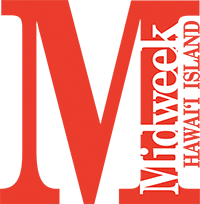The Big Fish
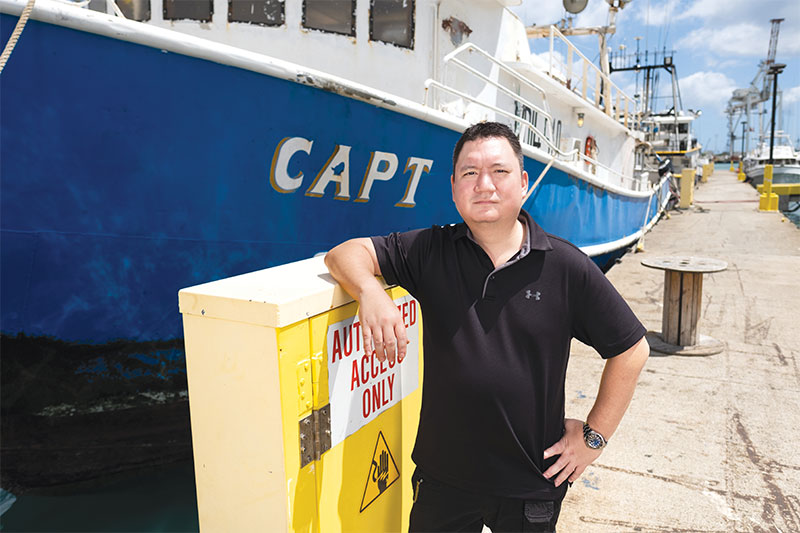
Life within the commercial longline fishing industry can be tough, but Michael Goto, auctioneer and assistant vice president of United Fishing Agency, is just the person to tackle it.
Whoever said that nothing good ever happens after midnight has never hung out at Pier 38 during the early morning hours. That’s the time when a number of commercial longline fishing boats begin pulling into Honolulu Harbor with crews eager to unload their sizable catch for anyone present to see.
And what good things harvested from waters around the Hawaiian Islands do they bring into port? Tens of thousands of pounds of bigeye and yellowfin tuna (‘ahi), striped marlin, mahimahi, pink snapper (‘ōpakapaka), wahoo (ono) and more. Once offloaded, these bounties of the sea are inspected, weighed, tagged and displayed on pallets for a number of buyers, including chefs, who congregate at the pier’s “fishing village” shortly before 5:30 a.m. for another very good thing: the only large-scale commercial auction staged between Tokyo and Maine.
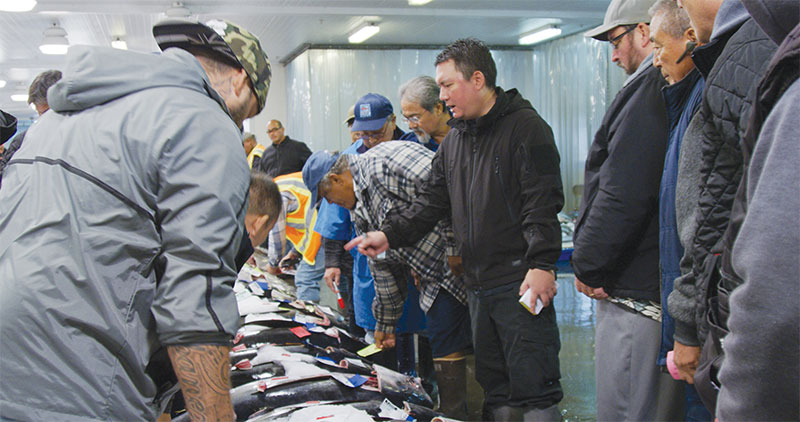
Michael Goto, who’s managed the Honolulu Fish Auction for the past decade, calls out prices as seafood buyers inspect the day’s catch and place their bids. PHOTO COURTESY UNITED FISHING AGENCY LTD.
Supervising all of this activity while waiting to ring the traditional brass bell — the signal that announces the start of each day’s bidding — is Honolulu Fish Auction manager Michael Goto. It’s a role he’s held for the past decade and one that he takes particular pride in, in part because he understands all the good that the local seafood business does for the islands.
“The commercial fishing industry is the largest food producer in the state,” says Goto, who also serves as assistant vice president of United Fishing Agency, the entity that runs the auction and is celebrating its 70th year in business. “We’re really 80%-90% of the local production of food in the state, so if we’re talking about food security, we’re the most important industry.
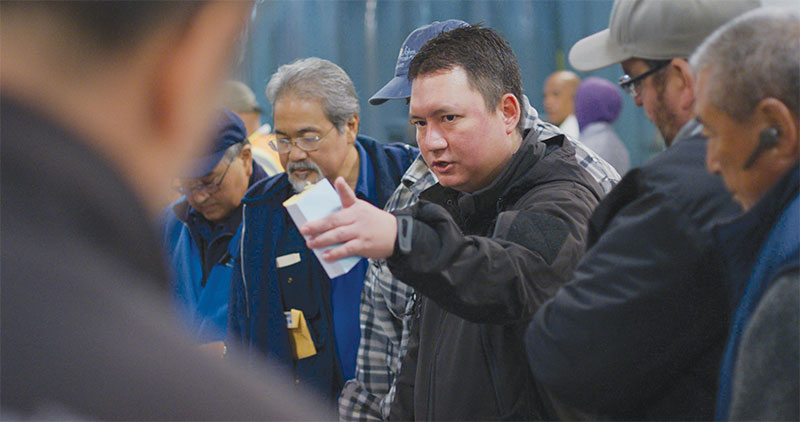
After ringing the traditional brass bell at 5:30 a.m., Michael Goto, manager of the Honolulu Fish Auction, moves the bidding process along among competing seafood buyers. PHOTOS COURTESY UNITED FISHING AGENCY LTD.
“Fresh fish is not only a cultural staple here,” he adds, “it’s also an economic necessity.”
Naturally, the auction — which is modeled after the former Tsukiji Market auction in Tokyo, where fish were sold individually rather than by the boatload to wholesalers — plays an essential part of the process of getting fish from sea to store and, ultimately, onto tables. On every day of the week except Sunday, buyers representing the wholesale, retail and restaurant industries descend upon Pier 38 and bid against one another on the value of each fish, all while Goto moves between pallet displays on the refrigerated auction floor calling out prices. Typically, the public sale lasts three to four hours, but the event has been known to go on for longer.
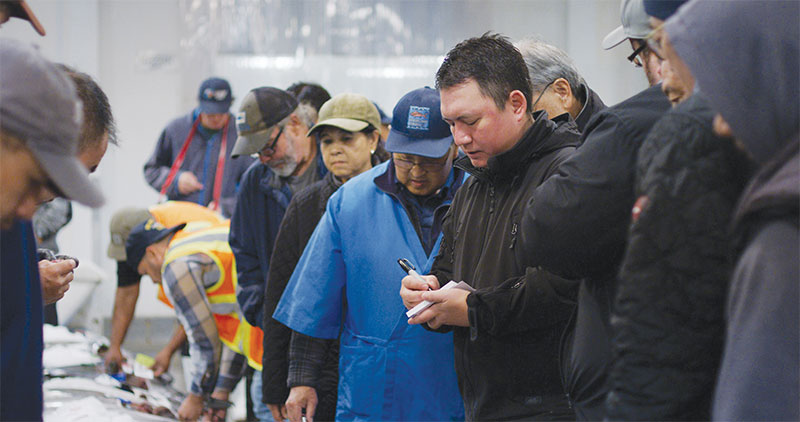
PHOTOS COURTESY UNITED FISHING AGENCY LTD.
“We basically run the auction until the day’s allotment is done,” explains Goto. “We average between 50,000 and 80,000 pounds of fish a day, but we’ve even done over 100,000 pounds a day around certain holidays like Christmas and New Year’s, just because there is that much demand.
“We’re really the only venue that promotes the display-type system of palletizing fish with ice, putting them onto our auction floor, cutting their tails and taking core sampling out of the interior — all so that our buyers can inspect every single fish, value the product themselves and be willing to pay whatever the market value is,” he continues, adding that the agency, which is inspected annually by the U.S. Food and Drug Administration, employs strict protocols regarding fish handling at the auction and quality control at sea.
At the conclusion of each public sale, seafood buyers are immediately invoiced on winning bids, and fishermen from the fleet’s 140 vessels who brought in the day’s catch are paid. Thereafter, purchased fish are trucked to O‘ahu stores, hotel chains and restaurants, flown to the outer islands and the mainland, and even exported to Japan, Canada and Europe, where they are turned into poke or a myriad of other beloved appetizers and main dishes.
But wherever the fresh fish land, the people there are certain to be happy with these locally sourced, premium-fresh goods, according to Goto.
“It’s really a sought-after commodity,” he says. “A lot of vendors will tell you that Hawai‘i’s seafood is the best in the world.”
Goto is certainly no fish out of water when it comes to auctioneering. Fact is, he’s a natural at it as a third-generation operator of the local auction, which made its debut on Aug. 5, 1952, at ‘A‘ala Park.
That also happens to be the same year that United Fishing Agency was established following the merger of several longline fishing companies in the islands, all of them with roots in the flagline fishing method introduced by Japanese immigrants to Hawai‘i in the early 1900s. One of the operation’s central figures was his grandfather, Frank Kunio Goto, who served for decades as its general manager.
“He’s the one who really brought me into this industry, and he was the one who grew the market to where it is today,” says Goto of his grandfather, who died in 2019 at age 97. “He worked directly with (company founder) Matsujiro Otani in building both the fishing fleet and the market vending that we rely on. From the 12 boats they started with to today’s 140 boats, from a handful of vendors to at times 20-plus vendors, and from the entire Hawaiian chain to the U.S. mainland, he was really the key person in developing all of that.”
Although he grew up around the Honolulu Fish Auction — which moved to its second site at Kewalo Basin in the late ’70s before settling into its current location at Pier 38 in 2004 — Goto was not hooked by the business early on. When he graduated from Loyola Marymount University in 2007, his intention was to take a year off “to get my bearings” before following in the footsteps of his father, an attorney.
But much like the proverbial little fish, Goto’s grandfather was not about to let him get away.
“I was going to apply for the William S. Richardson School of Law at UH-Mānoa, but he kind of kept coaxing me into taking a part-time position at the agency,” recalls the ‘Iolani School alumnus. “He’d say, ‘Come work and earn some money.’”
Eventually, the constant baiting worked and Goto joined the agency, attracted by the challenge of bringing the business into the 21st century.
“I saw that it had a brand-new facility in Honolulu Harbor, but (the operation) had still not been modernized,” he recalls. “When I came in, I started learning and I was like, ‘Yeah, I can really modernize this place to the standards of the day.’
“From then, the business grew on me and I got to spend more time with my grandfather, learn from him, see how important he was and how big of a deal he was in the community and the business as well. It all caught on with me and it made for an easy decision to finally go full time.”
Consequently, he’s managed to navigate his way up the company ladder in the years since, progressing from handling administrative duties to performing outreach work and serving as a board member with the Hawai‘i Longlines Association. Along the way, he’s even strengthened his voice within the industry by working on the Western Pacific Fishery Management Council, which operates under the U.S. Department of Commerce and helps to manage fish stocks in the region.
“But my most prestigious accolade was when President Obama made me a commissioner on the Western and Central Pacific Fisheries Commission, which is essentially the U.N. of the Pacific Ocean as far as tuna management is concerned,” says Goto proudly. “I’m still the U.S. commissioner for that.”
Just as importantly, the 37-year-old workaholic plans to continue filling those vital roles of his at United Fishing Agency for the foreseeable future. And that’s a good thing considering how many fish lovers there are here in the islands and around the globe, and how much the fishery industry needs forward-thinking individuals
like Goto to help it flourish. “This industry is pivotal to the state,” he says in closing. “It’s what gets me up in the morning every day. It’s definitely not an easy life, but I take the responsibility seriously. It’s great that I can follow in my grandfather’s footsteps. I mean I could have gone my father’s way as well, but I discovered how important the industry is and all that it stands for, and it definitely made more sense for me to be here.”
